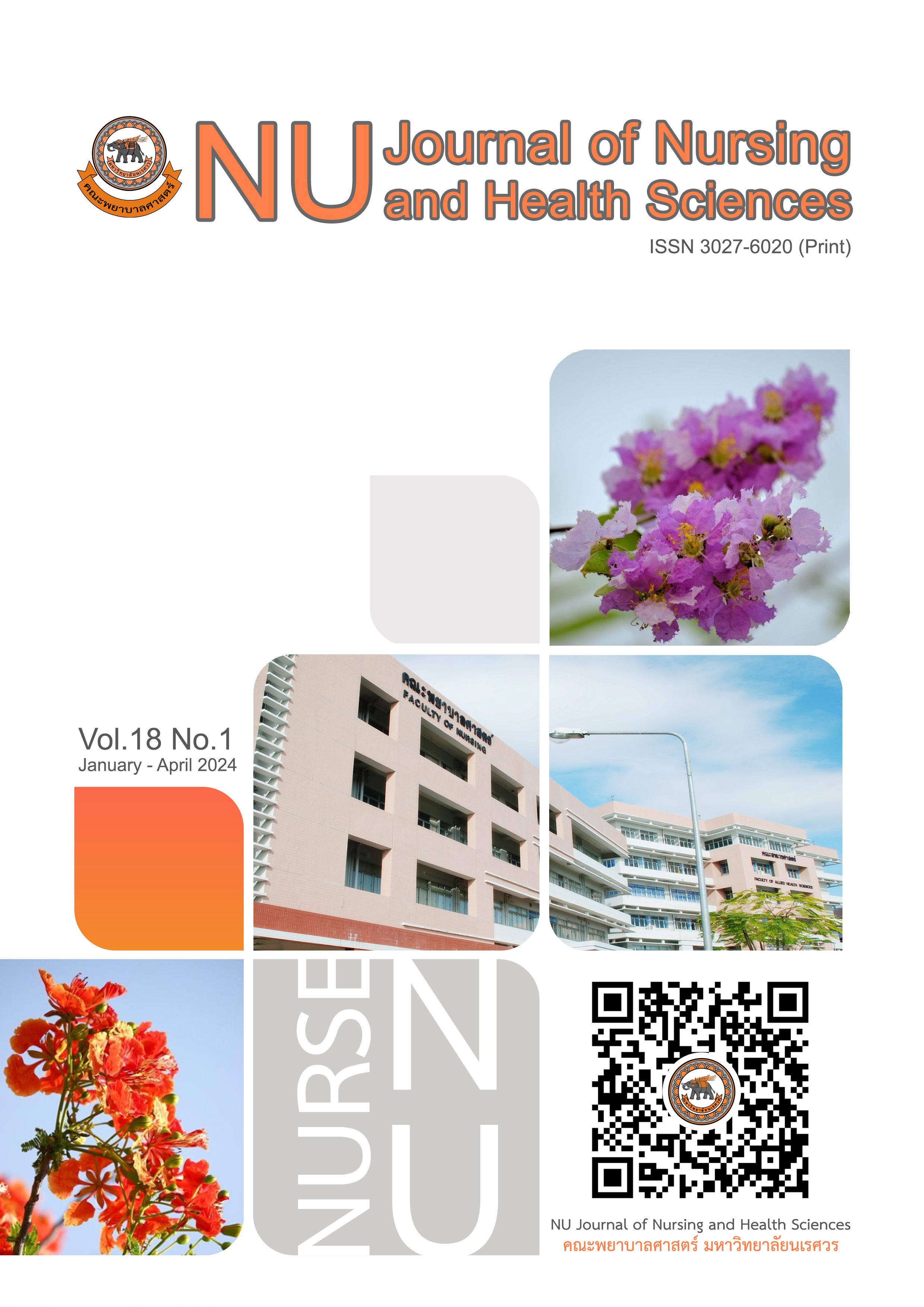ผลของโปรแกรมเตรียมความพร้อมการเปลี่ยนผ่านสู่การเป็นเบาหวานขณะตั้งครรภ์ ต่อพฤติกรรมการควบคุมระดับน้ำตาล และระดับน้ำตาลในเลือดของหญิงตั้งครรภ์ ที่รักษาด้วยอินซูลิน
Main Article Content
บทคัดย่อ
การวิจัยครั้งนี้ เป็นการวิจัยกึ่งทดลองมีวัตถุประสงค์ เพื่อศึกษาผลของโปรแกรมการเตรียมพร้อมการเปลี่ยนผ่านสู่การเป็นเบาหวานขณะตั้งครรภ์ ต่อพฤติกรรมการควบคุมระดับน้ำตาลในเลือด และระดับน้ำตาลในเลือด ของหญิงที่เป็นเบาหวานขณะตั้งครรภ์และรักษาด้วยอินซูลิน ที่เข้ารับการรักษาครั้งแรกในโรงพยาบาลตากสิน ระหว่างเดือนมกราคม พ.ศ. 2565 ถึงเดือนพฤษภาคม พ.ศ. 2565 จำนวน 50 ราย คัดเลือกกลุ่มตัวอย่างตามเกณฑ์การคัดเข้า สุ่มตัวอย่างเพื่อเข้าเป็นกลุ่มทดลองและกลุ่มควบคุม กลุ่มละ 25 ราย กลุ่มทดลองได้รับโปรแกรมการเตรียมความพร้อมการเปลี่ยนผ่าน สู่การเป็นเบาหวานขณะตั้งครรภ์ เป็นระยะเวลา 6 สัปดาห์ ประกอบด้วยกิจกรรมการประเมินความพร้อมการเปลี่ยนผ่าน การเตรียมเพื่อการเปลี่ยนผ่าน และการใช้บทบาทเสริมของพยาบาล กลุ่มควบคุมได้รับการพยาบาลตามปกติ เก็บรวบรวมข้อมูลด้วยแบบสอบถามพฤติกรรมการควบคุมระดับน้ำตาลในเลือด มีความเชื่อมั่น .77 และแบบบันทึกระดับน้ำตาลในเลือด วิเคราะห์ข้อมูลโดยใช้สถิติพรรณนา สถิติทีแบบอิสระ และสถิติแมน-วิทนีย์ ยู ผลวิจัยพบว่า กลุ่มทดลองมีคะแนนเฉลี่ยพฤติกรรม การควบคุมระดับน้ำตาลในเลือดสูงกว่ากลุ่มควบคุมอย่างมีนัยสำคัญทางสถิติ (t = 9.33, df = 36.37, P <.001) และมีระดับน้ำตาลในเลือดเฉลี่ยต่ำกว่ากลุ่มควบคุมอย่างมีนัยสำคัญทางสถิติ (z = 2.06, P = .01 ผลการวิจัยครั้งนี้เสนอแนะว่า พยาบาลและผดุงครรภ์ควรมีการเตรียมความพร้อม สู่การเป็นเบาหวานขณะตั้งครรภ์ให้แก่หญิงตั้งครรภ์ เพื่อให้มีพฤติกรรมการดูแลสุขภาพที่เหมาะสม และควบคุมระดับน้ำตาลในเลือดให้อยู่ในเกณฑ์ปกติ
Article Details

อนุญาตภายใต้เงื่อนไข Creative Commons Attribution-NonCommercial-NoDerivatives 4.0 International License.
เอกสารอ้างอิง
Boonsatean, W. (2016). Living with type 2 diabetes in a Thai population: experiences and socioeconomic characteristics. Doctoral Dissertation, University of Malmo, Sweden.
Cohen, J. (1988). Statistical power analysis for the behavioral science (2nd ed.). HillS.D.ale, NJ: Lawrence Erlbaum Associates.
Danyuthasilpe, C. (2018). Pender’s health promotion model and its applications in nursing practice. Songklanagarind Journal of Nursing. 38(2), 132-141. [In Thai].
Devsam, B. U., Bogossian, F. E., & Peacock, A. S. (2013). An interpretive review of women’s experiences of gestational diabetes mellitus: proposing a framework to enhance midwifery assessment. Women and Birth, 26, 69-76.
Guariguata, L., Linnenkamp, U., Beagley, J., Whiting, D. R., & Cho, N. H. (2014). Global estimates of the prevalence of hyperglycaemia in pregnancy. Diabetes research clinical and practice, 103(2),176-185.
Hui, A. L., Sevenhuysen, G., Harvey, D., & Salamon, E. (2014). Stress and anxiety in women with gestational diabetes during dietary management. The Diabetes Educator, 40(5), 668- 677.
International Diabetes Federation. (2019).
IDF Diabetes Atlas. (9th ed). Brussels.Meleis, A. I., Sawyer, L. M., Im, E. O., Messias, D. K. H., & Schumacher, K. (2000). Experiencing transitions: an emerging middle-range theory. Advances in Nursing Science, 23(1), 12-28.
Phoodaangau, B. (2013). Transition theory: its application to family nursing care. Thai Journal of Nursing Council, 28(3), 107-120.
Rojnawaseree, D. (2018). The effect of health promotion and spouse support to the blood glucose level and health-promoting behaviors in women at risk of gestational diabetes mellitus. Nursing Public Health and Education Journal. 19(3), 47-58.
Schumacher, K. L. & Meleis, A. I. (1994). Transitions: a central concept in Nursing. Journal of Nursing Scholarship. 26(2), 119-127.
Schmitt, A., Gahr, A., Hermanns, N., Kulzer, B., Huber, J., & Haak, T. (2013). The diabetes self-management questionnaire (DSMQ): development and evaluation of an instrument to assess diabetes self-care activities associated with glycaemic control. Health Qual Life Outcomes, 11, 138.
Sriyasak, A., Chookanhom, P., Sridawrung, C., & Kaoaiem, H. (2020). Application of transition theory in becoming teenage parents. Journal of The Royal Thai Army Nurses. 21(2), 1-8. [In Thai].
Srisawat, K., & Sikaow, O. (2014). Management for gestational diabetes mellitus. Journal of The Royal Thai Army Nurses. 15(2), 50-59. [In Thai].
Suwannarat, K., Tachasuksri, T., & Siriarunrat, S. (2019). Effects of a self-management support program on diabetes self-management behavior and blood sugar level in women with gestational diabetes mellitus. Journal of phrapokklao nursing college. 30(2), 1-13. [In Thai].
Sitkulanan, P., & Kumtip, P. (2020). Impact of a self-management programme monitored through the application LINE on eating behaviour, arm-swing exercise behaviour, and blood glucose levels in women with gestational diabetes mellitus. Journal of Thailand Nursing and Midwifery Council. 35(2), 52-69. [In Thai].
Nelson, R. K., Hafner, S. M., Cook, A. C., Sterner, N. J., Butler, E. L., Jakiemiec, B. E., & Saltarelli, W. A.(2022). Exercise during pregnancy: What Do OB/GYNs Believe and Practice? a descriptive analysis. Women's Health Reports (New Rochelle, N.Y.), 3(1), 274-280.
Radarith, C., Tachasuksri, T., & Siriarunrat, S. (2019). Factors influencing self-management among women with gestational diabetes mellitus. The Journal of Faculty of Nursing Burapha University, 27(1), 50-59. [In Thai].
Thato, R. (2018). Sample size calculation using power of test. Nursing research: concepts to application (4th ed.). Bangkok: Chulalongkorn University Printing House. [In Thai].


